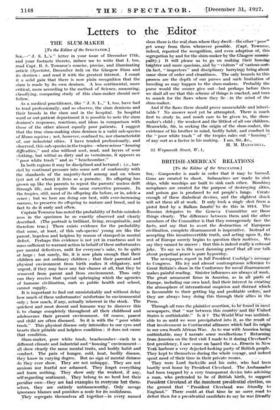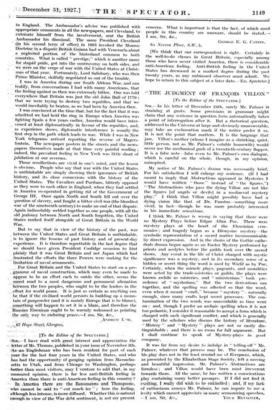BRITISH-AMERICAN RELATIONS - [To the Editor of the SPECTATOR.] Sm,— -Gunpowder
is made in order that it May be hurned. Guns are created to shoot. Submarines are made to 'sink ships, while warships are built to sink each other. .ROmbing aeroplanes are created for the purpose of destroying Cities, and poison gas is produced to rot people's lungs. Create enough of these diabolical devices, and the slightest -shock will set them all at work. It only took a single _shot from a pistol fixed by a Balkan fanatid5to do this in 1914.The Russian delegates to the Geneva- Committee see those things clearly. The difference between them and the Other members of the Committee is that they -courageously face the facts, and say that to avert the destruction of European civilization, complete disarmament is imperative. Instead of accepting this incontrovertible truth, and acting upon it, the rest of Europe merely begins to question their motives. We say they cannot be sincere ; that this is indeed really n colossal joke. To say so is the most damning proof -that. all Ourtalk about perpetual peace is pure hypocrisy.
The newspapers report in full President Coolidge'S message to Congress. His icy and armoSt contemptuous 'reference to Great Britain's sharein the Conference fer.naYal-disermament Makes painful reading. Sinister influences are always at werk. The great armament firms in America, Os in all parts of Europe, including our own land, find their interest in creating the atmosphere of international suspiCion and distrust *Inch is favourable to their getting big and prokalde orders; and they are always busy doing this through their allies iii the
Press. • .
Through all runs the plaintive assertion, to beleimaiii Most newspapers, that "war between this Country and the United States is unthinkable." Is it ? The Wcirld War was unthink- able to us until we were precipitated into it, as the result of that involvement in Continental alliances 'which hid its origin in our own South African War. As to war with America beiug unthinkable, may I narrate some recollections ? Returning from 4merica on the first visit I made-to it during Cleveland's first presidency, I saw come on buard the s.s. Etruria in New York -harbour a very dejected-looking party- of British. people. They kept to themselves during the whole voyage, and indeed
spent most of their time in their private rooms. .
They were Lord Sackyille and his suite, who had, been hastily. sent home by President Cleveland. - The Ambassador had been trapped by a very transparent device into advising a man, who pretended to be of British birth, to support Preaident Cleveland at the. imminent presidential election, on the ground that "President Cleveland- was - friendly to England." There .could .at that time be no surer, road to defeat than for a presidential candidate, to say he wal friendly to England. The Ambassador's advice was published with appropriate comments in all the newspapers, and Cleveland, to extricate himself from the involvement, sent the British Ambassador his dismissal. The same President Cleveland (in lifs second term of office), in 1895 invoked the Monroe Doctrine in a dispute British Guiana had with Venezuela about
,neglected pcirtion of the hinterland common to both countries. What is called "prestige," which is another name
• for stupid pride, got into the controversy on, both sides, and we were on the verge of war with the-United States at Christ-
. .
Inas Of that year. Fortunately, Lord Salisbury, who was then Prime Minister, skilfully negotiated us out of the trouble.
I was in America during our Smith African War, and can • testify, from conversations I had with many Americans, that the feeling against us then was extremely bitter. One was told everywhere that Britain was just the old John Bull of 1770; that we were trying to destroy two republics, and that we would inevitably be beaten, as we had been by America then. I was convinced at the time that, but for the fact that it was admitted we had held the ring in Europe when America was
• fighting Spain a few years earlier, America would have inter- vened at least diplomatically in favour of the republics, and, as experience shows, diplomatic interference is usually the first step in the path which leads to war. While I was in New York telegrams arrived reporting the reverse of Magers- fontein. The newspaper posters in the streets and the news- papers themselves made at that time very painful reading ; indeed, the prevalent feeling in New York was little short of jubilation at our reverses.
ThiaSe recollections are vivid in one's mind, and the lesson is obvious. People who say that war with the United States. is unthinkable are simply showing their ignorance of British
• history, and its close connexions with the history of the United States. The Cavaliers and Puritans, bitterly opposed as they were to each other in England,- when they had settled in America co-operated in getting rid of the Government of George III. Once again North and South fell out over the question of slavery, and fought a bitter civil war (the bloodiest war of the nineteenth century) to make an end of that dispute. -Again indissolubly welded together as one people, with all the old jealousy between North and South forgotten, the United States ranked itself alongside of Great Britain in the World War., But to say, that in view of the history of the past, war between the United States and Great Britain is unthinkable, , is to ignore the lessons 'of past history and of present-day _ experience. It is therefore regrettable in the last degree that we should have given President Coolidge occasion to hint plainly that it was Great Britain and not Japan. which had frustrated the efforts the three Powers were making for the limitation of naval armaments.
,..,For Great Britain and the United States to start on a pro- , .grarnme of _naval construction, which may even be made to , appear to be an effort each to outdo the other, seems the surest road to a most dangerous and permanent alienation
. .
'between. the two peoples, who ought to be the leaders in the _r.effort. for world peace. It is just as certain as anything can be that if the civilized world persists in building up a moun- tain of gunpowder (and it is mainly Europe that is to blame), _something will happen to set it in a blaze, and therefore the• Russian Eirenican ought to be warmly welcomed as pointing the only way to enduring peacc.—I am, Sir, &c., 67 /lope Street, Glasgow; 4793REW L ,w.



























 Previous page
Previous page